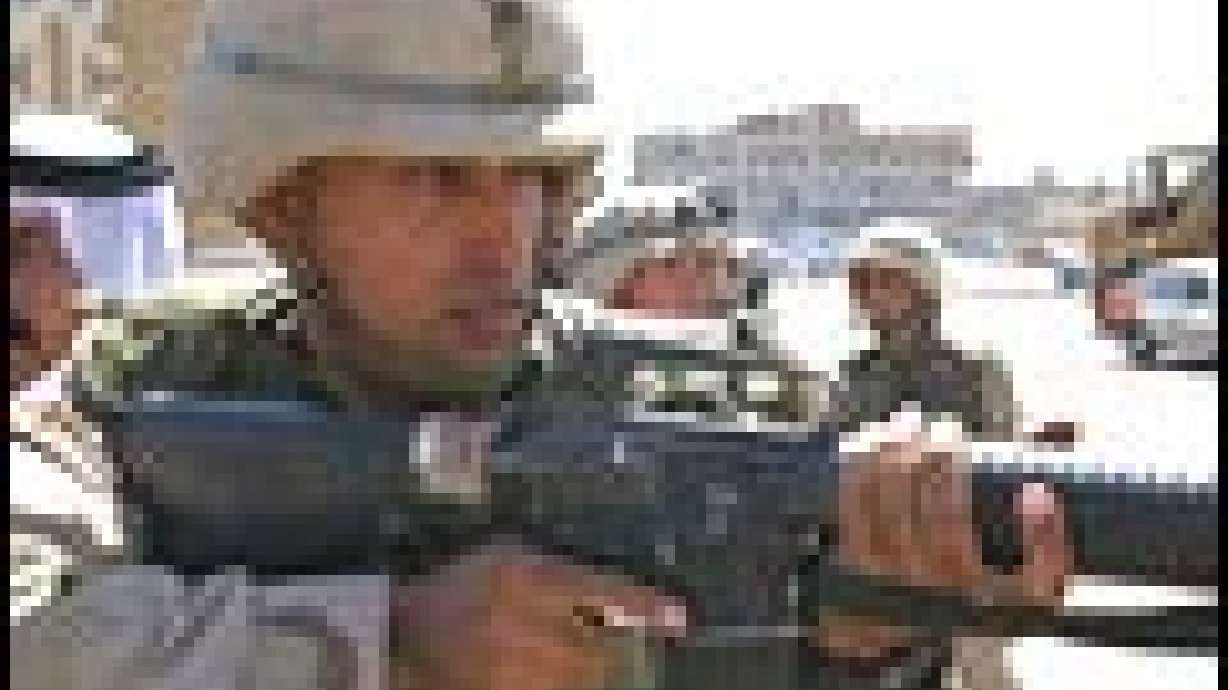Estimated read time: 4-5 minutes
This archived news story is available only for your personal, non-commercial use. Information in the story may be outdated or superseded by additional information. Reading or replaying the story in its archived form does not constitute a republication of the story.
BALAD, Iraq (AP) -- Iraqi attackers hiding in a thicket of reeds rushed a U.S. tank column, setting off a battle joined Friday by Apache helicopters and Bradley armored vehicles. Twenty-seven Iraqis were killed, pushing the number of opposition deaths to about 100 in the U.S. operation to hunt down supporters of Saddam Hussein's fallen regime.
The battles -- the most intense fighting since the Iraq war ended two months ago -- follow the U.S. strategy of luring opposition holdouts into the open, where their assault rifles and rocket launchers are no match for American forces equipped with computerized weaponry and heavy armor.
Just before midnight Thursday, a large force of insurgents detonated a land mine and fired rockets on a two-tank patrol of the 4th Infantry Division about 30 miles northwest of Baghdad, said Lt. Col. Andy Fowler.
The tanks returned fire, killing four assailants. The patrol called in reinforcements, including Apache helicopters, and gave chase to the fleeing attackers, killing 23, U.S. Central Command said. There were no American casualties.
Hossein Sadoon was sleeping on the roof of his home nearby when he heard the explosion of rockets, followed by more explosions and the rattle of automatic fire. After several moments of silence, another column of U.S. armored vehicles rumbled up the road, he said.
Fowler, looking haggard, said the pursuit lasted through the night and into daylight. Some attackers fled through sunflower fields and ducked into sand-brick houses.
"I ordered my men to cease fire. We searched the houses and found two men and several women and children," he told reporters. The soldiers uncovered no weapons in the houses, and the residents were released.
Fowler, of the 3rd Infantry Division, said his patrols had been ambushed several times before, "but nothing like last night." He added: "It was a very long night."
Now headquartered in Tikrit -- the tip of the so-called Sunni Triangle that marks the heartland of anti-American resistance -- the 4th Infantry Division is one of the U.S. military's toughest and most technologically advanced. Its combat vehicles are equipped with computers and tactical Internet, enabling troops to know each other's positions and avoid friendly fire.
U.S. strategists said the military has been preparing to strike the remnants of Saddam's fighting forces since the end of the war, gathering intelligence on their whereabouts and capabilities and taunting them into action.
"We will maintain that pressure, causing him to react to us, rather than vice versa," said Lt. Gen. David McKiernan, U.S. ground forces commander in Iraq. "Are there bad guys still out there? Absolutely. Are we going after them? Absolutely."
On Thursday, U.S. aircraft and ground forces launched a coordinated attack on what U.S. authorities called a terrorist training camp northeast of Baghdad, killing 70 opposition fighters. One American soldier was wounded.
A Pentagon official said most of the dead were non-Iraqis, apparently among the thousands of volunteers from other Arab countries who poured into Iraq before the war and who put up the stiffest resistance to the American thrust on Baghdad.
Among the weapons found in the camp were 70 to 80 surface-to-air missiles, the Central Command said.
McKiernan, speaking over a video link from Baghdad, told reporters in Washington that the attacks against U.S. troops in Iraq did not appear to be coordinated by any central authority. He said the attacks were "only coordinated locally, not nationally."
Capt. Chris Carter, commander of A Company, 3rd Battalion, 7th Infantry Regiment, said the number of attacks was rapidly decreasing since the 3rd Infantry began aggressive patrols around Fallujah, a key center of resistance west of Baghdad. He said the Iraqis usually manage to escape, but their tactics are crude and largely ineffective.
Recent attacks involved wildly firing assault rifle or rocket-propelled grenade from outside the weapons' effective ranges, or planting crude mines along the road that can be spotted well before U.S. troops are in any danger.
"Overall, I think they are poorly organized and not coordinated," Carter said. "Most likely they are common criminals being paid by former Baath party members to conduct the attacks and destabilize the coalition."
In another development, U.S. troops acting on an intelligence tip arrested 74 people described as sympathizers of the al-Qaida terrorist network in a raid Thursday near the northern city of Kirkuk, Central Command said.
Meanwhile, in northern Iraq, two explosions damaged an oil pipeline about 155 miles north of Baghdad. It was unclear whether it was sabotage or an accident, but U.S. Army spokesman Capt. John Morgan said in Baghdad the explosions appeared similar to previous accidents.
(Copyright 2003 by The Associated Press. All Rights Reserved.)








